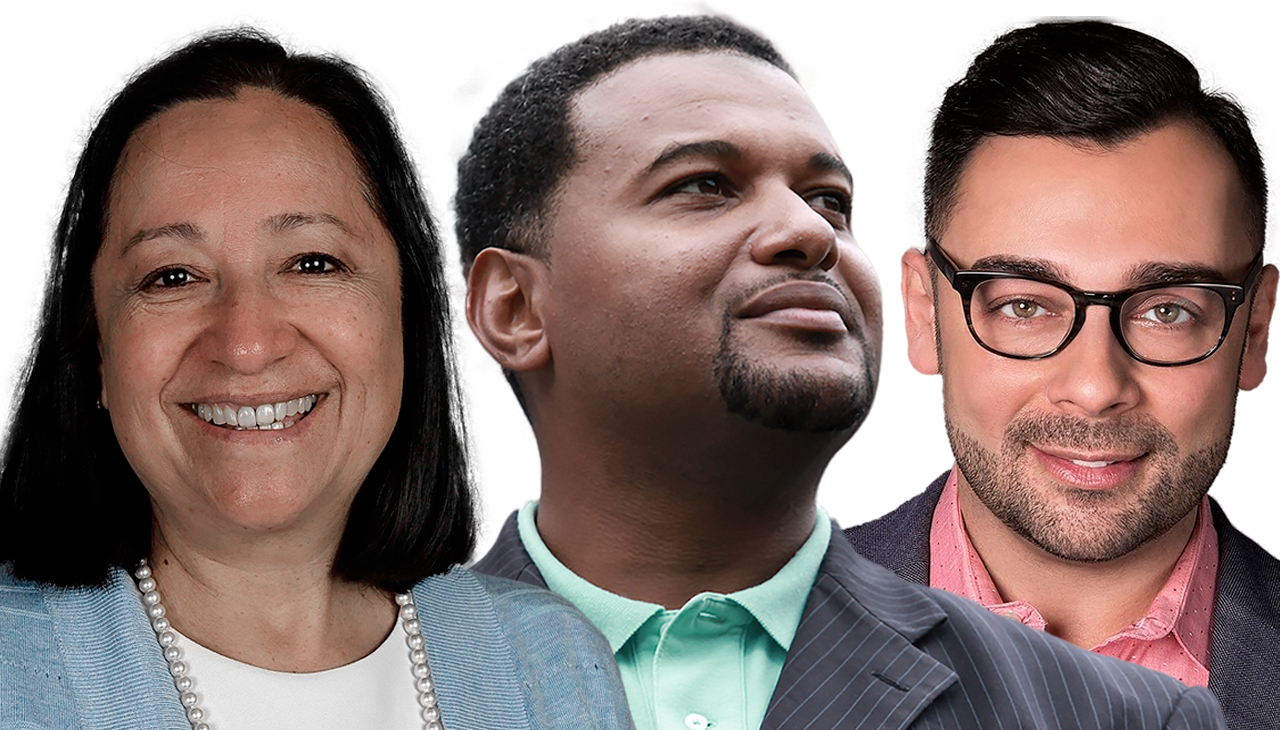
Amplifying the fight for Racial Equity
Bank of America recently honored five organizations across the country with an award, $200,000, and a year-long leadership program.
In the past two years, the fight against racial inequality has been brought to the forefront in a large way.
Since the Black Lives Matter protests in 2020, businesses, institutions, and individuals have been wrestling with ways to fight systemic racism and its consequences.
Racial equity vs. racial justice vs. racial equality
Racial equity is one of many terms that have been thrown around in discussions of systemic racism. Other terms include racial equality and racial justice. So what is the difference between these three terms and can each be achieved?
Race Forward is a non-profit focused on racial justice that was founded in 1981. It defines racial equity as the process of removing racial disparities and making things better across the board. It involves the “intentional and continual practice of changing policies, practices, systems, and structures by prioritizing measurable change in the lives of people of color.”
The nonprofit’s definition of racial justice is “a vision and transformation of society to eliminate racial hierarchies and advance collective liberation, where Black, Indigenous, Latinx, Asian Americans, Native Hawaiians, and Pacific Islanders, in particular, have the dignity, resources, power, and self-determination to fully thrive.” Race Forward notes that racial equity is part of how racial justice can be achieved.
Racial equality is giving equal opportunities to people of all races. The difference between the three is what type of change occurs. Racial equality is for the individual, racial equity is systemic, and racial justice is societal.
Pledging money for racial equality
In the wake of George Floyd’s murder in May 2020 and the subsequent protests thereafter, 50 companies pledged around $50 billion to address racial inequality. The Washington Post found that $45.2 billion of that was distributed in the form of loans and investments like mortgages that the companies could benefit from.
The Post also found that an overwhelming majority of the money was allocated for economic equality. Only $70 million went to organizations that are focused on criminal justice reform, the main reason for the 2020 protests.
It is difficult to know if these companies are actually making good on their promises. There is no central entity that tracks corporate promises, and corporations aren’t required to report where their money is going or what impact it's having.
Neighborhood Builders: Racial Equality Award honorees
As part of Bank of America’s commitment to racial equality, the corporation expanded its long-time Neighborhood Builders program by launching the Neighborhood Builders: Racial Equality Award at the end of March. The award went to five U.S. non-profits that are “advancing racial equality and economic opportunity in Black, Hispanic-Latino, Asian American, and Native American communities.”
AL DÍA News spoke with senior leadership members at each non-profit that was honored — except for the AAPI Equity Alliance, which advocates for the rights and needs of the Asian American and Pacific Islander community in Los Angeles County and beyond — about their organization, its impact, and how the award will help them continue their work moving forward.
Partnership for Southern Equity, Atlanta, GA
Nathaniel Smith is the founder and Chief Equity Officer of Partnership for Southern Equity (PSE), a non-profit focused on racial equity in Georgia and the American South. The non-profit was founded in 2010 to address issues of systemic racism and inequity in the South and covers the areas of the economy, climate, health, and growth.
PSE has had an impact on both the local and national levels. The organization worked alongside the community to get a $13 million referendum passed that expanded Atlanta’s transit system. They also created the Justice 40 Accelerator, which helps organizations across the country get the benefits of the Justice 40 executive order. This sets aside 40% of federal investment benefits in clean energy and climate for historically marginalized communities.
Smith plans to continue to grow the organization in ways that are effective.
“My hope is that PSE’s success will inspire more organizations to emerge in the South, we just don’t have a lot of organizations at the size and level of PSE. And my hope is that more than anything through my commitment, and through the work of the organization that will inspire other young people to say ‘hey I can do that too, and I don’t have to wait for permission to do it.’ That is my hope,” he said.
Decolonizing Wealth Project, New York City, NY
Edgar Villanueva is the founder and Principal of Decolonizing Wealth Project. Villanueva founded the organization in 2018 after the success of his book “Decolonizing Wealth: Indigenous Wisdom to Heal Divides and Restore Balance.” The organization works to provide “a framework around healing and opportunities to use money as a tool to facilitate healing in the form of reparative giving and reparations.”
Decolonizing Wealth Project has been able to increase investment and money that goes to communities of color through its fund, Liberated Capital, and its philanthropic partners. This year, they expect the amount of money to hit between $8 and $10 billion. In addition to getting funds directed to communities of color, they are also working to remove barriers that keep people of color out of the philanthropic sector. They are doing this by modeling best practices on who to put on boards and who makes decisions about resources.
Their goals for the future include changing public attitudes toward issues like reparations through TV and film. They also want to help Black and Brown organizations get long-term, sustainable funding.
“We’re working towards a world where racial equity has become a societal norm – where new systems ensure everyone can live their best lives, thrive in their cultures, and heal from generations of colonial trauma.”
UnidosNow, Sarasota/Manatee, FL
Luz Corcuera is the Executive Director of UnidosNow. The non-profit was founded in 2010 due to the rapid growth of the local Latino community and in response to an anti-immigrant bill that had been proposed. The nonprofit’s name is a combination of unidos, the Spanish word for united, and now, which Corcuera explained is for “if not now, when?”
The organization is focused on helping students with school and going to college/getting certifications. They are working to foster the creation of opportunities for students, parents, and the next generation. Corcuera joined the organization in 2010 in a more background role, and in 2015 was asked by the board to become the Executive Director.
During her tenure, she has worked to accomplish the organization’s mission by looking at expansions that go deeper rather than broader. Since UnidosNow originally focused on high school and college students, Corcuera has expanded its programming to include elementary and middle school students with programs like Future Leaders Academy for Girls (FLAG) and Future Leaders Academy for Middle Schoolers (FLAM).
“It is very rewarding to see that there is an entire pipeline of higher education; that it is being built every day. Our slogan at UnidosNow is ‘Dream Big,’ and we support and encourage those dreams every step of the way,” Corcuera said.
RELATED CONTENT
Students who have gone through their programs have gotten over $8 million in scholarships.
Corcuera’s goal for the organization is to help all students pursue higher education opportunities, no matter what their goals may be.
“For us, it’s important that the kids know that the sky’s the limit and also that they have options. Not everybody wants a four-year college degree, some just want to stay local, go to our two-year college [and get a] degree, or sometimes pursue a high-quality technical qualification,” added Corcuera.
Management Leadership for Tomorrow, Bethesda, MD
Management Leadership for Tomorrow (MLT) is a non-profit founded in 2002 by John Rice, the current President and CEO. The organization “fights racial and economic disparities by empowering a new generation of diverse leaders.” This is done through career coaching and prep.
In addition to preparing diverse students for the workplace, MLT also prepares workplaces for diverse applicants. Cristal Baron, Vice President of Finance and Development at MLT, described the MLT Black Equity At Work certification as the LEED certification for racial equality. The certification provides a framework to show companies how to move towards racial equity.
MLT is using the funding from the Racial Equality award to organize larger classes for their programs. According to Baron, 98% of their career prep alumni get good jobs with an average starting salary of $80,000. This sets them up for more success later on and the ability to build wealth.
“One of the things that is still more true than I would like for it to be — but I think we’re moving in a better direction — is that people completely conflate issues of poverty and issues of race. And while there clearly is some overlap, those are not 100% overlapping issues. And the problem with assuming that they’re completely overlapping issues is that you then assume that the way in which to attack the one is going to be the same way in which you attack the other,” Baron added.
How can racial equity be achieved?
When the topic of racial equity is broached, a question that often follows suit is: how can it be achieved?
However, another concept that isn’t often highlighted is racial healing, which differs from racial equity by way of a needed acknowledgement of past wrongs, in addition to change.
Villaneuva noted two parts of the process to achieve racial healing — truth and reconciliation.
He argued that truth is being erased through things like book bans. He also noted that the U.S. hasn’t dealt with or apologized for the near genocide of Native Americans, or slavery.
“These are dark parts of our history that we continue to sweep under the carpet. And I think to get to a place of healing we have to rip the Band-Aid off, bring those truths forward, center the stories and experiences of people who have been impacted by this history, document it, teach it and take ownership of it,” Villanueva said. “If we are not doing that then I think this trauma is just festering underneath the surface and will continue to have division.”
He went on to say that this was a necessary part of getting reconciliation. Another part of reconciliation is asking the communities affected what they need to heal, as well as putting a lot of investment and reparations into those communities.
The work of each of the organizations honored is focused on investing in marginalized communities locally and nationally.











LEAVE A COMMENT: